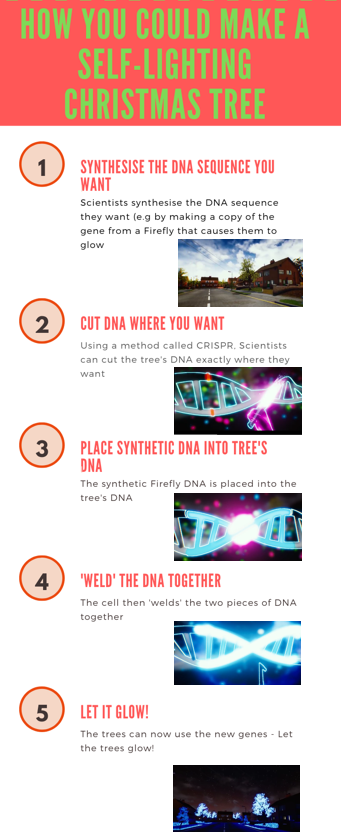Self-lighting Christmas trees could be the future
- Say goodbye to the tangled up tree lights as self-lighting Christmas trees could be the future…
- Scientists in the Department of Engineering and School of Life Sciences have the formula to make the trees – and can already do it by VR (virtual reality), all that’s left to do now is make them for real
- They can take the genes from fireflies to make synthetic DNA, which can make the trees light up when it gets dark
Say goodbye to tangled up Christmas lights, as self-lighting Christmas trees could be the future thanks to scientists from the Integrative Synthetic Biology Centre (WISB) at the University of Warwick using VR.
By using Virtual Reality (VR) scientists from the University of Warwick have managed to come up with the theory of making self-lighting trees.
It can be done using synthetic biology, an exciting field which aims to make biology easier to engineer with many applications from industrial chemical processes, to the environment and to healthcare. The team of engineers and biologists at WISB have shown how this process can be demonstrated through VR.
Through the interactive experience, we can see the process of how it would work:

But would they glow all the time? No! Plants know when it’s day and night as they, like humans, have a natural ‘body clock’, so we could harness their natural clock so that the light production is responsive to day and night.
This strategy can also be applied to other plants, for example trees on the streets meaning there would be no need for street lights.
street lights.
Dr Alexander Darlington of the Department of Engineering comments:
“Synthetic biology has the potential to revolutionise our lives and the pace of technological improvement is astonishing. Whether we do one day produce sustainable self-lighting Christmas trees remains to be seen but working on a project like this allows us to critically think about the impact of our work on society. The VR allows us to think about problems differently; working with designers and artists as we developed the experience caused me to reflect on my own work and its place in wider society.”
ENDS
18 DECEMBER 2018
NOTES TO EDITORS
Images available at:
https://warwick.ac.uk/services/communications/medialibrary/images/december2018/step_1_normal_street.png
https://warwick.ac.uk/services/communications/medialibrary/images/december2018/step_3_cut.png
https://warwick.ac.uk/services/communications/medialibrary/images/december2018/step_6_weld_dna.png
https://warwick.ac.uk/services/communications/medialibrary/images/december2018/dna_2_2.png
About Warwick School of Life Sciences
Warwick Life Sciences is an international centre of excellence with more than 80% of our research rated as 'world leading or internationally excellent' in the REF 2014 assessment. We are ranked 4th in the UK for Bioscience (Guardian University League Tables 2019).
Our focus is in excellent teaching and research with impact.
In 2015 we were the BBSRC 5th highest funded institute and we have 27 PhD studentships per year from 2015-2019 through our BBSRC doctoral training partnership award.
Our research falls into four themes: Biomedical Science, Biotechnology, Environmental Bioscience, and Plant and Crop Science. This research impacts across a broad range of areas, particularly in crop improvement and protection, biosensing and early medical diagnoses, ageing, animal health, earth biosystems, pollution and environmental genomics.
Our facilities support multidisciplinary research programmes across Warwick and with other universities, research institutes and industry both nationally and internationally.
FOR FURTHER INFORMATION PLEASE CONTACT:
Alice Scott
Media Relations Manager – Science, University of Warwick
Tel: 02476574255 or 07920531221
E-mail: alice.j.scott@warwick.ac.uk
FOR FURTHER INFORMATION PLEASE CONTACT:
Alice Scott
Media Relations Manager – Science, University of Warwick
Tel: 02476574255 or 07920531221
E-mail: alice dot j dot scott at warwick dot ac dot uk
